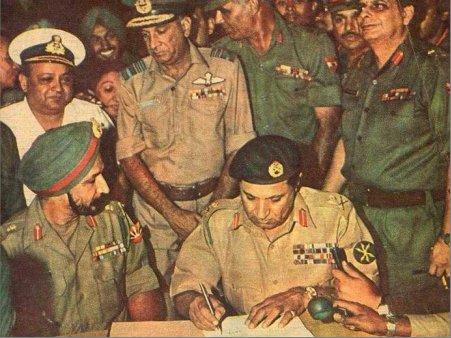
In olive green attire, he was a war hero liberating a shackled populace. As a politican, he fought for a people wronged in the 1984 riots.
Lt Gen (Retired) Jagjit Singh Aurora was the face of
Born in February of 1916 at Kale Gujaran village in Jhelum district, now in
His father Diwan Singh was an engineer in Jhelum (now in
| |
Once dubbed as the best dressed man in the country for his impeccable dressing sense,
He saw action in 1947-48, in 1948
He served in various staff appointments before being promoted to the rank of a Colonel and was posted as the Deputy Commandant of the
After attending a course at the
Being promoted as a Major-General in February in 1963,
He assumed charge of Deputy Chief of Army Staff in June 1966 with the rank of Lieutenant-General, the post which he held till April 1967. Then he was posted to the Eastern Sector as GOC of a Corps Headquarters. He took over as GOC-in-C, Eastern Command in 1969.
Historic moment
Gen
East Pakistan fell to the Indian Army and
Lt General A. A. K. (“Tiger”) Niazi, Commander of the Pakistani Forces in East Pakistan (Now
Gen Niazi finally signed in instrument of surrender on December 16, 1971 as 93,000 of his troops laid down arms.
Gen
Here’s the link for the same
http://www.bharat-rakshak.com/Temp/thankyousir.pdf
Gen Aurora became a Rajya Sabha member in 1987 from
“My six years in the Rajya Sabha were interesting though not as satisfying as the army service. The main reason being we did a lot of talking on some vital and quite often on points which did not merit much importance. On the whole, the achievements were very few. In the army even going on manoueveres carrying out sham-fighting gives greater satisfaction.”
He was awarded Param Vishisht Sewa Medal in 1971 and Padma Bhushan in 1972. He was also a member of the National Integration Council
About Indian Army
He felt the there is a dearth of brave and young people in the Indian army. He says “…government has to make the army more attractive, not only by giving larger pay and other emoluments but by giving the army officers the prestige that they deserve. I may mention that during the British days, a union commission officer when he went to visit any office he was offered a chair to sit down and due notice was taken of his problem which was expeditiously solved. Today, army officers are not given the status and prestige they deserve. This must be put right and more facilities provided to them to be able to live with their families if we want to improve the leadership of armed forces.”
He was as soldier who fought for 2 countries. The significance of keeping one’s head cool during war is very high. After his death one of the newspapers in
“The late General lived for another 34 years, after achieving that glorious victory. It is a shame that independent
About Indian politics
Gen. Aurora believed that Indian politics is going through a bad phase However the Indian politicians are not as bad and as unprincipled as
I salute to this turbaned Sikh who with his gentle personality will prove as an inspiration to each and every Sikh .

No comments:
Post a Comment